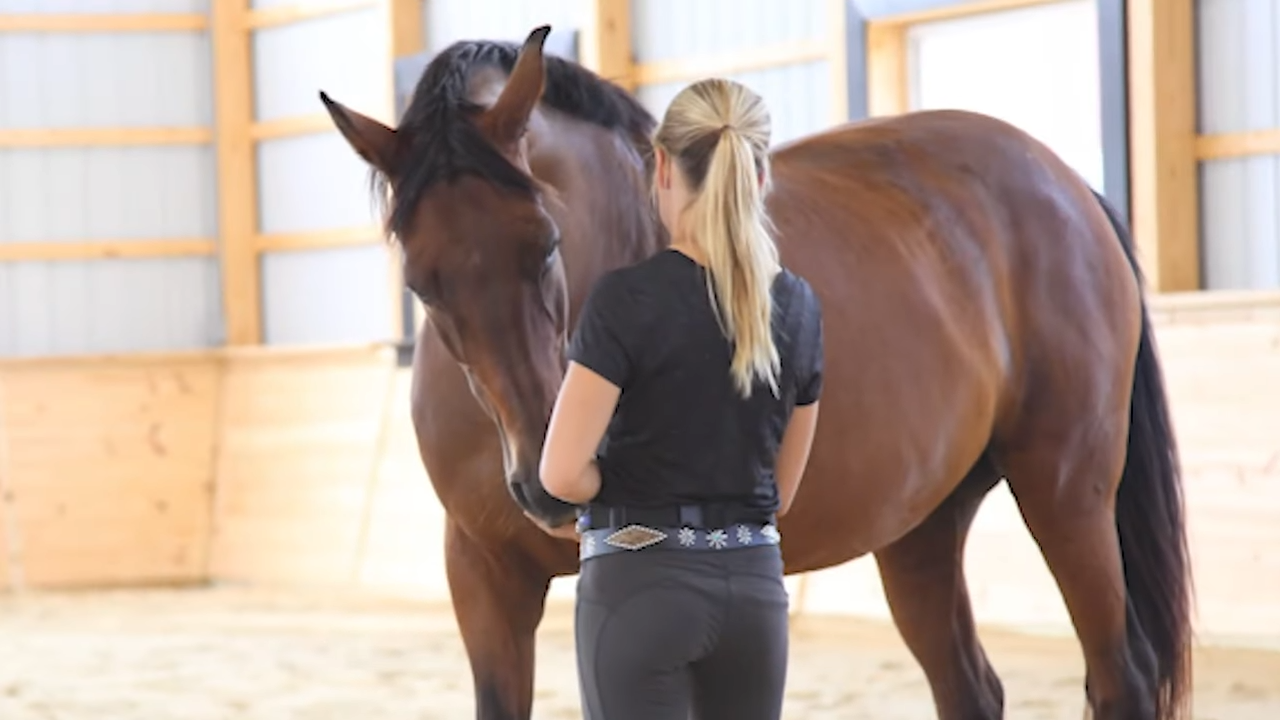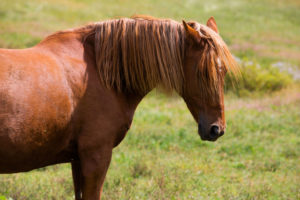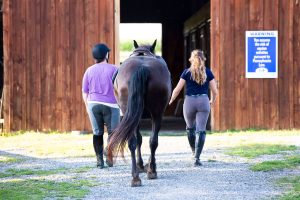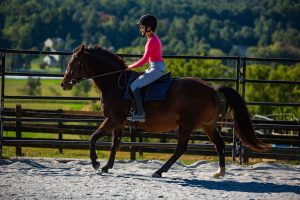When do you feel you can perform your very best?
When you are amped up, excited, and confident?
Calm and relaxed?
Your answer may vary… depending on what you are doing, and depending on you as an individual.
It is the same for our horses.
Today, we are talking about emotion, learning, and performance.
And how to find the best state for you and your horse, so you can be present in the moment together in your ride, not worrying about what might be around the next corner or feeling too bored and lazy.
Hit play to learn about the “inverted U theory” and how it can make you a better rider and horse person.














24 Responses
Breathing and centering myself, staying in my body, help me to be a better rider and person for my horse. My current school horse’s default mode is boredom, so it has been transformative to start with him on the ground. When he realizes, “Wow. You’re really here and expect me to pay attention because we’re doing some varied, interesting, and fun things,” he gives me his listening ears, nuzzles me gently, sometimes makes the funniest faces, and–most important for him–finds his forward (rather than shambling) walk and trot before I mount.
Nancy,
It sounds like you and your horse are well connected. Great work taking the time to tune into each other before you even mount up!
Calm, centered,open energy is where I can hear and absorb information. Relaxed and loose is when I ride best.
My horse… I think is similar. He can get anxious and then has difficulty responding, tends to brace. When relaxed he is much more responsive and confident.
Great video!!
Cat,
Absolutely! A calm frame of mind is often the most receptive mind state. Wonderful that you’ve noticed the difference with your horse.
Thank you Callie, this was very helpful. As I ride different horses (but know each one), sometimes I do get anxious or nervous, until I get a feel for how the horse is feeling. I can sense this through grooming a lot of times, and that calms me down, but once I am on and riding I try to keep myself calm and quiet which I hope will help the horse react in a positive way.
Marilyn,
Horses can sometimes feel the same way, getting anxious or nervous when they are unsure about their rider’s intention. Wonderful that you have found a way to connect and notice what your horse is feeling during grooming. Those moments are so important to set up a positive and relaxed ride experience together.
Excellent! In every riding session with my students we spend the first 10 minutes being mindful of our breathing and moving. I was so excited to hear you say those words I screamed!
As an occupational therapist, I work with many different people to be able to grade their emotions for self-regulation.
Kirsta,
What an awesome habit to teach your students!! Thanks for sharing.
Perfect timing! I had a “bad” ride yesterday. When I reflected on it, I can see a few possible reasons. 1) I had a terrible night’s sleep; 2) it was unusually chilly, windy, and sprinkling rain; and 3)I’m stressed generally about a remodel at home and the prospect of having to move to a new barn in a few months when mine closes. My horse was spooky, naughty with other horses in the arena, and didn’t want to give me any energy. The trainer jumped on him and he did fine. Yup, my energy.
Lisa,
We all have bad days, even our horses. It is good you recognized it may be your energy feeding into his, and allowed him to finish on a positive note with your trainer. It’s tough to relax our mind sometimes and it can affect our rides.
Any time you are feeling stressed before or during your ride, come back to your breath. Take the time to tune into your body and breathe deeply into your belly. It helps even if you push your belly out when you do this to open the space to breathe into. In the saddle, you can also spread your toes and bring awareness more to your body, and your horses, away from stressful thoughts.
You might check out this blog on your pre-ride routine and how to slow down before a ride, click here: https://www.horseclass.com/blog/is-your-pre-ride-ruining-your-ride/
This blog on tips for better breathing while riding may also be helpful to you: https://www.horseclass.com/blog/tips-for-better-breathing-horse-riding/
You explained that extremely well. I have a horse that is quarter horse/thoroughbred cross. Acting more like a thoroughbred. I have had him for just over a year and he was quite shut down when I got him. I have been studying natural horsemanship with a qualified trainer for probably 15 years (I’m a slow learner haha). Just kidding, I thoroughly enjoy it and it helped me immensely with my Canadian horse that I got when He was 7 months (I was green) and is now 25 years old. Anyway, my new horse has woken up due to using a language that he understands and is amazing. Through the program I can get him calm, connected and responsive( I won’t ride him unless he is all 3 of those things). BUT, sometimes he has such a fear of random things in which he will be beyond himself. I learned that to calm him down, I move him using the games that he knows and enjoys and understands. Such as circling, backup, sideways etc. and by gently moving him around his fear disappears. It felt to me like it was the same thing that you were calmly and clearly explaining. Thank you
Definitely calm and centered for me. If I stay calm so do my horses! I like transitions for gaining focus. If my horses are not with me mentally or I am distracted it throws the entire ride off.
Diane,
Absolutely! Being present is so important for you and your horse staying focused and connected.
Great video, really made me think about how my emotions affect my horse while we are riding. Calm is best for me and my horse, sometimes I get that frustrated because I can’t get her to learn something that my horse gets so anxious that she stops listening to my cues and starts doing things that she thinks I want her to do without me even giving her any cues,eg she’ll start side passing or backing up without me even asking. I never want her to feel like that again by stopping my emotions from escalating.
Deb,
When a horse is unsure about your question, they may guess at answers and offer behaviors you did not ask for. Good sign of intelligence for your horse, but if it’s being driven by anxiety it may not be a productive learning mind state. It’s awesome that you have become aware of that exchange and pattern from changing your own mind state, and finding more confidence in being calm!
Thank you for video explanation.
Good reminder. My horse is reactive and sensitive so I have to be 100% present and calm otherwise he can feel any anxiousness I may have through my body.
When I’m calm/present it makes a difference, I can think better, quicker, defuse therefore decreases his degree of reactiveness.
When I’m listening/feel him getting anxious, & immediately acknowledge I’ll action side pass/random changes of direction/circle around objects/serpentine & stay relaxed.
If I’m not in a confined safe area I will dismount & immediately start active groundwork lots of yielding. I’ll lead him for as long as required, I won’t remount until I feel he has calmed down & listening again.
if I’m too late to sense/feel this change though, he stops listening to me, his ‘reactiveness’ heightens so it’s a much longer process to get his attention back.
My 6 year old quarter horse is calm most of the time. However if something, a movement or noise behind him occurs he will spin around and look at it. Doesn’t go over to good in a show pen. I have done lots of desensitizing activities with him but it still happens. Getting back on him soon after a hip replacement. Someone has been riding him for me during these past few months. I can literally walk around him doing a whip and no problems. He can sort cows no problem. But let a cow move behind a covered fence move and he might spin around.
I was anxious before a performance and when I went to bridle my well-trained horse and asked him for “head down”, he threw his head in the air and backed up. It really showed me what a sensitive guy he is. I have to be very calm and very confident with him.
I definitely work better when I’m calm and need to do breathing exercises before every ride as I’m managing anxiety issues. I’ve maybe become too calm as my gypsy cob youngster has now become very lazy in the arena. I’m going to try the frequent transitions you mentioned. I feel like I’m doing a dance with my horse sometimes as how he works depends on his mood, so I have to adjust my energy each ride. Callie Thankyou for these tips, I get something out of every lesson!
This has come at a perfect time for me. I am not a confident rider to begin with and this has been exacerbated due to my ongoing cancer treatments. My horse does tend to pick up on my emotions very easily and if I am feeling the least bit uncertain, he becomes uncertain also and resistant resulting in a vicious circle. This is a new thing for him so I am feeling a bit discouraged. However I went back through the warmup activities and just need to work out a cue for breathing. I do tend to hold my breath.
My horse and I definitely do much better riding by ourselves and in a calm state of mind. He totally responds to my mood. When he knows that I’m in a relaxed state of mind he is very loving so that just feeds on itself. As a musician I cannot stress how much music influences the horse and the rider. I know what to choose on a particular day as I’m grooming him. Perhaps he wants to just chill. The other day we ran through our free style to Gratia Plena.
Karen, first I’m so sorry to hear about your ongoing cancer treatments. That was me last year! The doctors thought I was totally nuts! I went for my radiation treatments every morning at 9:00 and then immediately went to the barn to ride. It was the best therapy. I had to have help lifting the saddle but the stable guys were great. Where I found strength was in just wrapping my arms around my horse’s neck and soaking in the love that I felt for him. I’m a professional musician and use music in my riding. If you have access to a CD player or can buy one try David Foster’s CD Eleven. He wrote it at the height of the pandemic as a panacea to all of the stress people were feeling. I hope that this helps.
My mare can change emotions very rapidly. She can be half-asleep being groomed, the notice something out of the corner of her eye and be on high alert, prancing around, then when she realises that it’s ok, go back to very relaxed very quickly. I find this really challenging and would love some advice around this. She also picks up on my emotions very easily – if i am the slightest bit tense, then she becomes tense, then i get more tense… I find it’s all very well knowing the theory, but not so easy to break the cycle – but breathing, smiling etc does help a bit.
Hello, my issue is when we go sole riding, I am pushing my horse (Reggie) along until we start heading for home. If we are riding with our riding buddies (1 or 2 at most), Reggie is forward moving, leading the way and does not like it when the other horses come up on him, he will cut them off. Not so bad when it is just my small group of 2 but if we go on trail rides with up to 10 or more horses it becomes an issue. He is hard to control and the ride is not enjoyable as I am continually trying to slow him down from racing to the front of the pack. He was injured on our first trail ride doing this and I get a bit nervous going out on the bigger trail rides.
Reggie is 19yrs young and we have been together for 2 years. He has a lot more experience than I do. He is a lovely horse very good temperament and lovely to ride most of the time, he does do a bit of head shaking when we trot/canter (this may be because he is unfit). He is recovering from a separate injury and just getting back into riding. He is unfit but we’re working on this.
Have you got any advise for me on how to manage him on the bigger trail rides please.
Thanking you in advance
Diane